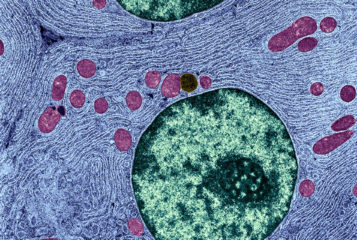An extensive study examining human embryos created using mitochondrial donation has demonstrated that the technique does not adversely affect embryo development and could effectively reduce the risk of passing on mitochondrial disease.
Researchers examined genes in embryos that had undergone a mitochondrial donation technique called pro-nuclear transfer (PNT). Their findings, published in Nature, showed that the embryos obtained by mitochondrial donation were indistinguishable from those obtained by conventional IVF, and there was no observed increase in chromosomal abnormalities that could lead to health conditions.
Most embryos had only a very small percentage (less than two percent) of faulty mitochondria that were carried over from the original affected embryo. If a child has less than 30 percent faulty mitochondria then they will generally be free of mitochondrial disease, explains New Scientist.
Mary Herbert, senior author of the study and professor of reproductive biology at Newcastle University, said: 'Having overcome significant technical and biological challenges, we are optimistic that the technique we have developed will offer affected women the possibility of reducing the risk of transmitting mitochondrial DNA disease to their children.'
The team had previously developed PNT, in which chromosomes inherited from the mother and the father are transferred from a fertilised egg with faulty mitochondria into a denucleated donor egg containing healthy mitochondria. However, even though the researchers had already shown the feasibility of the technique, they only had access to donor eggs that were discarded from IVF due to genetic defects and were therefore not able to conclude whether the technique could give rise to healthy embryos. The latest study involved more than 500 healthy eggs donated by 64 women.
The team also conducted experiments using stem cells derived from the PNT embryos to see whether the carried-over mutated mitochondria would take over the healthy mitochondria of the donor egg, as was suggested by a recent study (reported in BioNews 852). However, they saw that in one cell line out of five, more faulty mitochondria accumulated over time.
Professor Doug Turnbull, director of the Wellcome Trust Centre for Mitochondrial Disease at Newcastle University and co-author of the study, said: 'Our studies on stem cells does express a cautionary note that it might not be 100 percent efficient in preventing transmission, but for many women who carry these mutations the risk is far less than conceiving naturally.'
Recently, MPs voted in favour of allowing the use mitochondrial donation under licences granted by the Human Fertilisation and Embryology Authority (HFEA). An expert scientific panel convened by the HFEA asked for more evidence of safety before it would consider issuing the first licence to a clinic.
Sarah Norcross, director of the Progress Educational Trust, which publishes BioNews, told BuzzFeed: 'The HFEA now must reconvene its expert panel to consider these findings. For the sake of patients hoping to be treated with mitochondrial donation, we hope that this will be done without delay.'
Sources and References
-
Three-person babies IVF technique 'safe'
-
Doctors edge closer to creating babies with DNA from three people
-
New safety and efficacy evidence for mitochondrial donation revealed
-
Towards clinical application of pronuclear transfer to prevent mitochondrial DNA disease
-
'Three-parent baby' success could see trials in two years







Leave a Reply
You must be logged in to post a comment.